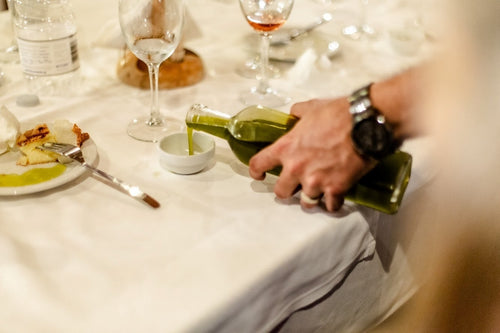What Is EVOO?

EVOO is an acronym for extra virgin olive oil, and it is a classification of olive oil that requires the product meet a strict set of regulations for a company to apply it to their product. Though the standards may vary between countries, the International Olive Council actually provides a succinct definition that is typically followed by most nations.
The International Olive Council’s Definition
According to the International Olive Council, EVOO is “virgin olive oil which has a free acidity, expressed as oleic acid, of not more than 0.8 grams per 100 grams and the other characteristics of which correspond to those fixed for this category in the 10C standard.”
Clearly, this is not a terribly helpful definition for those who are not well versed in olive oil, but it is more than adequate for those who regulate EVOO within the different nations. If you are interested in learning more about the different types of olive oil and definitions, you can check out the International Olive Oil website for more details and explanations of the different types and their many uses. You will get an idea of the standards that many countries and areas that produce EVOO use when determining their own policies.
The Classifications of Olive Oil
EVOO is considered the purest form of olive oil, but it is certainly not the only king. In the United States, there are five classifications. In terms of classification, EVOO is the highest grade, and it is the one that many professional chefs use, particularly in places like Italy and Greece.

- EVOO is the purest and usually the product that people prefer for cooking. It has a better flavor and odor than the other classification. It also tends to be healthier.
- Virgin olive oil is the next most commonly used olive oil. It is less costly and for those who don’t know the difference, it can be an acceptable substitute for EVOO.
- Lampante virgin olive oil is not something that can be sold for consumption. The poor taste and odor make it off-putting enough that people are not likely to attempt to ingest it. Typically, this olive oil is further processed for consumption or is included for other uses.
- Refined olive oil is the product of further refining olive oil, but it does not change the initial glyceridic structure of the product. It does not have an odor or flavor.
- Olive oil is a blended form of olive oil (usually mixing virgin olive oil and refined olive oil). It is fit for human consumption and can add flavor to many different dishes.
EVOO Specifications
Regardless of what organization or country is defining EVOO, there are certain aspects that are relatively universal. While it is often said to taste better than virgin olive oil, for a product to be labeled EVOO it must meet several requirements for the chemical composition and the method used to produce the oil.
The following chemical standards are used by nations like Greece and Italy to ensure that their products are appropriately labeled EVOO.
- The free fatty acidity of the product must not exceed 0.8%.
- The level of peroxides cannot exceed 20 milliequivalents per kilogram.
- It must have UV absorbency of no more than 0.22 for K270, no more than 2.5 for K232, and less than 0.01 for Delta K.
The process by which the product is made must also follow some very strict guidelines.
- The final product cannot include any fruit other than olives taken from olive trees.
- Nothing may be added during the process, so the producer cannot add any solvents or heat.
- The only processes that the fruit can go through are washing, decantation, centrifugation, and filtration.
- The temperature of the process must remain under 27°C (80°F).
Some EVOO also goes through taste tests to ensure that it does not have any flaws that would require it to be labeled as virgin olive oil. Sometimes the smell or taste can make a product seem inferior, even if it appears to pass many of the other tests.
EVOO is a label that many producers take pride in displaying because the process and requirements are strict. The label reflects the care and attention the producers took to make a very high-quality product.


